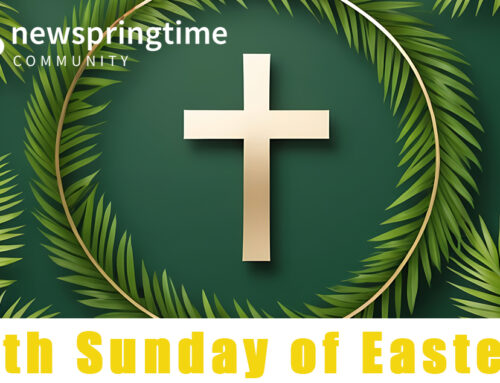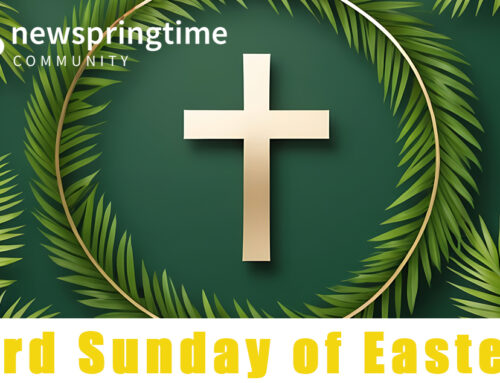The Catechism of the Catholic Church – Course Notes – Wednesday 18th October 2023
To download The Catechism of the Catholic Church course notes for 18th Oct 2023, please click here
Catechism commentary week six on faith
In this commentary I want to share some thoughts on different but interrelated forms of faith. Many years ago, Steve Clark suggested in his short book Growing in Faith that there were three forms of faith discernible in the New Testament, especially in the gospels, namely, believing, trusting and expectant.
1] Believing faith could be referred to as doctrinal or propositional faith. In Par 143 of the Catechism of the Catholic Church we read, “By faith, man completely submits his intellect and his will to God. With his whole being man gives his assent to God the revealer. Sacred Scripture calls this human response to God, the author of revelation, “the obedience of faith.” When my late mother and I used to discuss theological issues, she would often conclude by saying, “Pat these mysteries are beyond the grasp of my limited mind, I am content to believe what the Church believes.” The danger of this type of faith is that it can be propositional rather than personal. Pope John Paul proposed another definition of faith in par. 51 of his Encyclical on the Holy Spirit entitled Lord and Giver of Life, “faith is the openness of the human heart to the gift: to God’s self-communication in the Holy Spirit.” Rather than focusing on doctrines, this understanding of faith focuses on God who is revealed to us especially in the person of Jesus Christ.
2] Trusting faith which involves confidence in the goodness, benevolence, and providence of God. The CCC mentions this kind of trusting faith when it cites the example of Abraham and Mary, as our father and mother in faith because they had such belief in the God of the promises that they trusted that the promises of God would be fulfilled. As St Elizabeth said to our Lady, “blessed are you Mary because you believed that the promise of God would be fulfilled.” There are three kinds of trusting faith.
(A) The free unmerited gift of saving grace. That is what the hymn Amazing Grace is about. Everyone needs this kind of faith, because it is the faith that opens us to saving grace. As St Paul said in Eph 2:8, “For by grace you have been saved through faith. And this is not your own doing; it is the gift of God.”
(B) In everyday life those with trusting faith believe in the providence and the provision of God. They have such trust in God that they believe that all things, good and even bad work for good in the long run. As St Paul said in Rom 8:28, “we know that all things work together for good to them that love God, to them who are the called according to his purpose.”
C) Trusting faith of the hesitant kind. A person with hesitant trust accepts God’s promises at a notional level believing them to be true. However, when faced by a particular problem such as an illness, he or she may not be quite sure whether God is acting or about to act, right now, in these particular circumstances. So, the person prays a prayer of petition in the hope that God may do something in the future, if what is asked is in accordance with the divine will e.g., “Lord I know that nothing is impossible to you. I ask you, if it is your will, to heal this person whom you love.” This is praying in hope, however, Jesus never said to anyone, “your hope has made you well.”
3) Expectant faith goes from hesitant to convinced trust in the God of the promises and the promises of God. A person with expectant faith accepts that promises of God are true at a notional level. But as a result of a divine revelation/inspiration in a particular situation of need, e.g., he or she has no lingering doubts and confidently believes that the Lord is acting, or soon will act. Often such a person prays a declaratory prayer of command rather than a supplicatory prayer of petition (Mk 11:23; Lk 17:6). Instead of having to see evidence in order to believe, this kind of confident faith believes in order to see. As the letter to the Hebrews 11:1 puts it: “Faith is the assurance (in the present) of things hoped for (in the future), the conviction (in the present) of things not seen” (in the future). This is the faith that moves mountains.
St Cyril of Jerusalem (313-386) said, “The word ‘faith’ has two meanings.
First of all, it is concerned with doctrine, and it denotes the assent of the soul to some truth. Faith in this sense brings blessing and salvation to the soul, as the Lord said, ‘He who hears my word and believes him who sent me, has eternal life; he does not come to judgment’ (Jn 5:24) . . .
The word ‘faith’ has a second meaning: it is a particular gift and grace of Christ. . . . Faith in the sense of a particular divine grace conferred by the spirit is not primarily concerned with doctrine but with giving people powers which are quite beyond their capability. He who has this faith will say to the mountain, ‘Move from here to there’ (Mk 11:23), and it will move, and anyone can in fact say these words through faith and believe without hesitation that they will come to pass, receives this particular grace. . . . As far as it depends on you then, cherish the first gift of faith which leads you to God and you will receive the higher gift which no effort of yours can reach, no powers of yours attain.”
Next week pars 199-231





